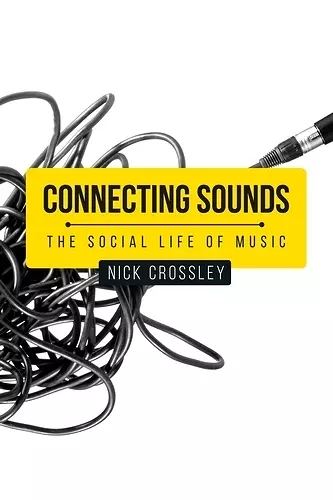Connecting Sounds
The Social Life of Music
Format:Hardback
Publisher:Manchester University Press
Published:17th Mar '19
Currently unavailable, and unfortunately no date known when it will be back

Nick Crossley argues that music is a form of social interaction, interwoven in the fabric of society and in constant interplay with its other threads. Musical interactions are often also economic interactions, for example, and sometimes political interactions. They can be forms of identity work, for both individuals and collectives, contributing to the reproduction or bridging of social divisions. As such music both shapes and is shaped by the wider network of relations and interactions making up our societies at their local, national and global levels.
Successive chapters of the book track and explore these interplays, in each case combining a critical consideration of existing literature with the development of an original, ‘relational’ approach to music sociology. The result is a grand sociological vision of music that captures not only music’s context but ‘the music itself’. The book extends the project begun in Crossley’s earlier work on punk and post-punk ‘music worlds’, revisiting this concept and the network ideas that underpin it, whilst broadening its focus through a consideration of wider music forms and the meanings that music has for its participants.
'Focusing primarily on popular music, Crossley (sociology, Univ. of Manchester, UK) provides an in-depth study of music’s place in the social world. In investigating this matter, he shows the relationship to be far more complex than people involved with music might suppose. He explores his concept of what he terms “music worlds,” drawing on and critiquing ideas from fields such as relational sociology and semiotics as well as music-specific fields. He makes significant use of Christopher Small’s term “musicking” as he seeks to define music and explain how various types of music function in, influence, and are influenced by society. The nine chapters provide detailed discussions of topics such as music as social interaction, music’s economic aspects, definitions of mainstream and alternative music, social networking involving music, meaning in music, societal forces influencing musical taste, and societal diversity and politics in musical genres. Although Crossley names musical artists and pieces of music in his discussions, he does not provide musical analysis. This scholarly and meticulously documented work is best suited to specialists in sociology, sociology of music, and cultural studies.' (Reprinted with permission from Choice Reviews. All rights reserved. Copyright by the American Library Association.)
D. Arnold, University of North Texas
ISBN: 9781526126016
Dimensions: 234mm x 156mm x 14mm
Weight: unknown
224 pages